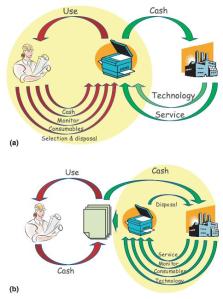State-of-the-art in product-service systems
Introduction – what is PSS
A PSS (product-service system) is an integrated product and service offering that delivers value in use. A PSS offers the opportunity to decouple economic success from material consumption and hence reduce the environmental impact of economic activity. This paper focuses on taking many papers and taking findings from them to give the reader a good summary of the content and understanding of PSS.
What are the three most important findings that you can take from this paper?
-
The model behind PSS is that rather than the customer buying the product and themselves having to manage all the expenses, (a) in the image below, servicing etc they buy the service of the features of the product for use in the business and the supplier handles all the servicing, consumables and disposal etc.

-
An example of effective PSS is ‘Rolls-Royce (R-R) deliver ‘power-by the-hour” which is that they do not sell the jet engines to the air lines rather than supply them but they ensure that they are efficient and they service them regularly. Another example (illustrated in the image above) is Cannon Photocopiers. Cannon does not sell the photocopiers to the businesses, instead they select a photocopier from their range based on requirements and then every so often they will come out will supplies and service the photo copier, once it is out of date/no longer fit for purpose, they take back the old one and replace it with the newer version or a more suitable one based on data collected.
- Issues with PSS is that it is relatively new so although good working examples are out there, marketing/accounting employees are not sure how to price/set up the contracts due to a lack of experience in the associated risk assessment and also putting into the contract how often it will be serviced etc. There is not much literature out there in how to asses the risks etc mainly due to the fact that each customer would be different and models are not fully developed for companies moving to this strategy.
How is it proposed that product service systems are more sustainable than traditional sales models?
PSS is more sustainable than traditional sales as when the product is with the customer, the supplier services it regularly, can collect data regarding usage and as a result suggest/implement best practice for each individual customer rather than the customer taking the product and through not knowing the best practices, make the product inefficient or possibly not service it as often as it should. This means it may be using more power or damaging internal parts which could have been resolved by more frequent services. In PSS ownership never transfers hands so it is in the suppliers interest to keep the product in its best shape. When the device is no longer fit for purpose (becoming obsolete or if the company requires a bigger/more advanced one) the supplier replaces it and knows how best to redeploy/recycle the older one, by taking still working parts for possibly services to other customers with the same product. They also have a more efficient logistics proceedure when hardware needs to be replaced. Another sustainability bonus is that if the supplier is the owner, it is in their interest to make the product last longer to keep their costs low, thus reducing the product turnover and this is benifitial in reducing the amount of manufacturing and making better use of the products and so the system is more sustainable.
How might this apply in the ICT sector?
Data storage in businesses is usually kept in internal servers as they are more secure and fewer people have access to them. PSS could come into play in internal data storage in a company where the server manufacturer could service the PCs perform any relevent updates etc while still having the security the data being kept within the business. The leasing of laptops, phones and other ICT equipment could be leased rather than sold which keeps the business up to date and efficient but without the massive capital expendature.
Another example of where it could be used it that the likes of function generators and oscilloscopes which need to be calibrated regularly to ensure that they are still accurate could be done on a PSS where rather than the company owning the equipment the provider would provide them with ‘always calibrated’ equipment and ensure that the latest software etc is on them and when a newer generator/scope comes out the business could upgrade easily without having massive expenses or having to deal with the disposal of the previous asset.
Posted on October 12, 2013, in EE4407. Bookmark the permalink. Leave a comment.
Leave a comment
Comments 0